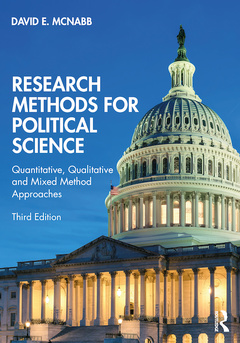Research Methods for Political Science (3rd Ed.) Quantitative, Qualitative and Mixed Method Approaches
Auteur : McNabb David E.

The third edition of Research Methods for Political Science retains its effective approach to helping students learn what to research, why to research and how to research. The text integrates both quantitative and qualitative approaches to research in one volume and covers such important topics as research design, specifying research problems, designing questionnaires and writing questions, designing and carrying out qualitative research and analyzing both quantitative and qualitative research data. Heavily illustrated, classroom tested, exceptionally readable and engaging, the text presents statistical methods in a conversational tone to help students surmount "math phobia."
Updates to this new edition include:
- Research topics chapters have been upgraded and expanded.
- Two mixed methods design chapters have been added.
- A new chapter on hermeneutic analysis designs and research with large data sets.
- The chapter on multivariate statistics has been expanded, with an expanded discussion on logistic regression.
- Tools on how to prepare and present research findings are now featured in the appendix, allowing instructors more flexibility when teaching their courses.
Research Methods for Political Science will give students the confidence and knowledge they need to understand the methods and basics skills for data collection, presentation and analysis.
Introduction Part 1: Foundations of Political Science Research 1. Introduction to Research Methods 2. Legal and Ethical Environment of Research 3. Research in Political Science 4. Paths Taken in Political Science Research 5. Research Decisions: Approaches and Designs Part 2: Quantitative Research Methods 6. Fundamentals of Measurement and Statistics 7. Introduction to Sampling 8. Exploratory Research: Probing Designs 9. Descriptive Research: Survey Designs 10. Experimental Research: Causal Designs 11. Basic Exploratory and Descriptive Statistics 12. Testing Research Hypotheses 13. Correlation and Simple Linear Regression 14. Exploring Multivariate Statistics 15. Research with Very Large Data Sets (Big Data) 16. Parametric vs. Nonparametric Statistics Part 3: Qualitative Research Methods 17. Beginning Qualitative Research: Document Research 18. Expository Research I: Text and Archival Designs 19. Expository Research II: Content, Meta-Analysis & Semiotics 20. Explanatory Research I: Case Studies and Historical Research 21. Explanatory Research II: Grounded Theory Designs 22. Interpretive Research I: Ethnographic Designs 23. Interpretive Research II: Hermeneutic Analysis Designs 24. Critical Research I: Feminist and Empowerment Designs 25. Critical Research II: Action Research Designs 26. Analyzing and Interpreting Qualitative Research Data Part 4: Mixed Methods Designs 27. Introduction to Mixed Methods Research Designs 28. Mixed Methods Research Designs Part 5: Appendices Appendix A. Presenting Data in Tables, charts and Graphs Appendix B. Preparing a Research Proposal Appendix C. Organizing and Writing a Research Report Appendix D. Using SPSS
David E. McNabb is Professor Emeritus and continuing adjunct professor at the Pacific Lutheran University School of Business. He has taught undergraduate and graduate management and administration courses for Edmonds Community College, Olympic College, Oregon State University, the University of Maryland-University College (Europe), the American University in Bulgaria, and the Stockholm School of Economics in Riga, Latvia, a regional business education program in Northern France, and the master’s in public administration program at Evergreen State College. Dr. McNabb has served in advisory positions for the U.S. Census Bureau, Seattle and Kirkland, Washington, and as an elected commissioner for a water and wastewater district in Washington State.
Date de parution : 12-2020
17.8x25.4 cm
Date de parution : 12-2020
17.8x25.4 cm
Thèmes de Research Methods for Political Science :
Mots-clés :
Quantitative Research; researchers; Public Administration; Social Science Research; hypothesis; Political Science Research; ordinal; Welfare Reform; level; Political Science Researchers; data; APSA; qualitative; Nonprofit Organization; thousand; Nonprofit; oaks; Literature Review; quantitative; Empowerment Research; Hermeneutic analysis designs; Mixed Methods Research Designs; Political Science; Follow; Research methods; Data Set; Political strategists; Nonparametric Statistics; Survey research; Expositive Research; Qualitative Research Strategies; Ordinal Level Data; Regression Analysis Procedures; Null Hypothesis; Quantitative Research Designs; Mixed Methods Designs; Mixed Methods Research; Postpositivist Approaches; Mixed Methods



